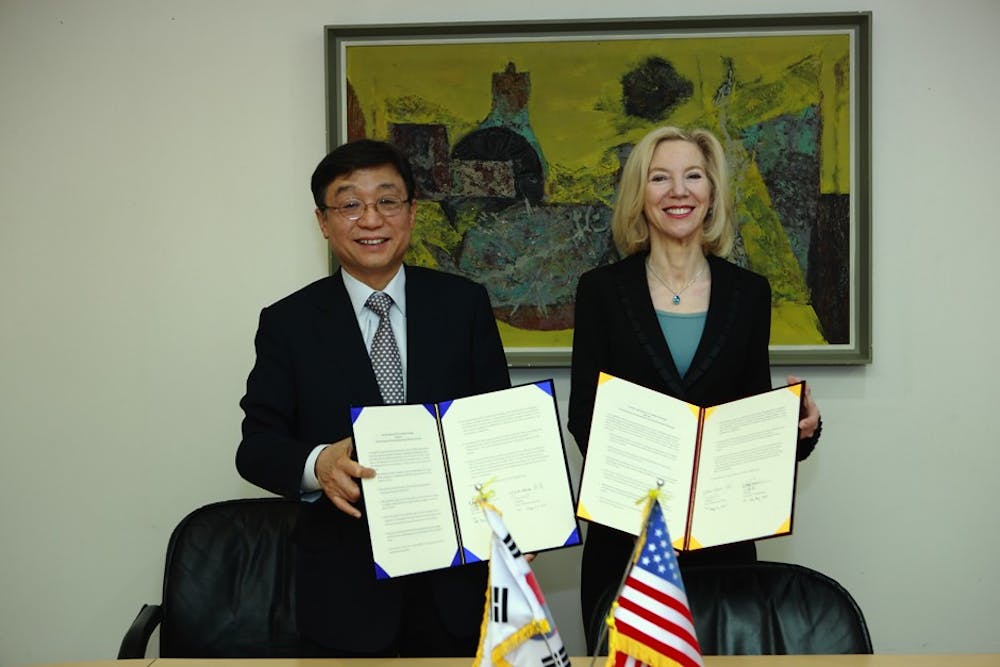
Penn is expanding its presence in Korea and its program in Korean Studies.
University President Amy Gutmann traveled to Seoul, South Korea, to sign a memorandum of understanding with Seoul National University, a renowned research university. The agreement — announced at SNU on Monday — seeks to build on the existing research and academic association between the two universities.
“Penn and Seoul National University share a devotion to the pursuit of knowledge across academic boundaries and national borders,” Gutmann said in a statement. “We are pleased to partner with Korea’s oldest national university and one of its most eminent, and to build on the many successful faculty and academic partnerships we already share.”
These partnerships include joint research projects and student exchanges. The Penn-in-Seoul summer abroad program, revived this year, will allow 20 undergraduate students to take courses at SNU and secure internships in Korea.
While in Seoul, Gutmann also announced two gifts totaling $7.5 million to Penn’s Korean Studies program.
James Joo-Jin Kim — who graduated from Wharton in 1959 and received a master’s degree in economics from Penn in 1961 — donated $6 million to enhance the program, which will be renamed the James Joo-Jin Kim Program in Korean Studies.
“I am pleased to strengthen this important program at Penn,” said Kim, who serves on Wharton’s Executive Board for Asia and is an Emeritus Trustee of Penn, in a statement. “Now is the ideal time for Penn to expand its eminent Korean Studies Program in a unique, dynamic, and even more competitive direction.”
Kim’s gift will finance additional visiting professors, graduate fellowships and post-doctoral fellowships.
An additional anonymous $1.5 million donation from the family of a Penn alumnus will establish the Moon Family Post-Doctoral Fellowship in Korean Studies.
The initiatives mark a new phase in the history of Penn’s program in Korean studies, which is one of the oldest of its kind in North America. The program began in 1963 with the University’s first course in the subject, and the University has offered Korean language courses since 1984.
In 1997, the Korea Foundation — an organization that aims to bolster Korea’s image around the world and support Korean studies programs — contributed $2.5 million to Penn to fund endowed chairs, visiting professors, graduate fellowships, academic research conferences, seminars and the expansion of the Korean collection in Van Pelt Library. The School of Arts and Sciences matched this gift with a $2.5 million grant of its own to enhance the program.
Today, students can receive a minor in Korean Studies and take courses in the Korean language that range from elementary to advanced business level.
“Penn is very proud of its long tradition of excellence in the study of Korea,” Dean of the School of Arts and Sciences Rebecca Bushnell wrote in an email. “This remarkable gift will allow us to build on that strength across an even greater span of disciplines and programs.”
Penn has a strong, long-standing relationship with Korea, a country which Gutmann said has “an important global presence.”
The nation represents the third-largest country of origin for international students at the University — 543 undergraduate and graduate international students were from Korea in the 2010-11 academic year, roughly 11 percent of the total international population.
Furthermore, Penn graduate Sung Kim, currently the U.S. Special Envoy for the Six-Party Talks, was reportedly recently selected as the next ambassador to South Korea by Secretary of State Hillary Clinton.
Penn’s schools have formal agreements with four Korean universities in addition to SNU.
The Daily Pennsylvanian is an independent, student-run newspaper. Please consider making a donation to support the coverage that shapes the University. Your generosity ensures a future of strong journalism at Penn.
DonatePlease note All comments are eligible for publication in The Daily Pennsylvanian.








